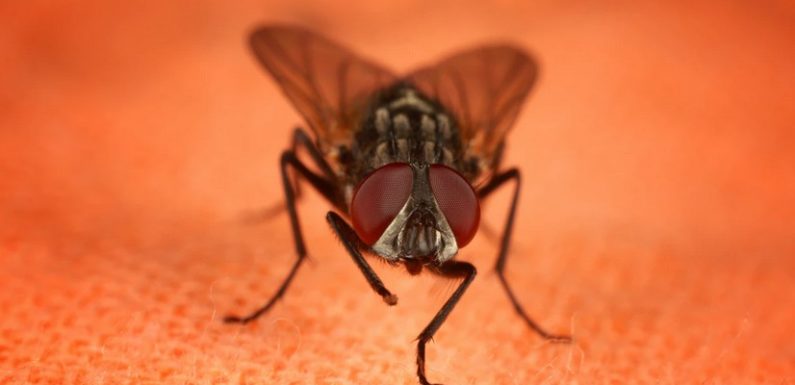
You’ll find houseflies, bottle flies, and fruit flies just about anywhere humans live, since they’ve adapted to feeding on garbage, leftover foods, and human waste. Because flies will feed on just about anything, they are vectors of bacteria in the home. Flies regularly transfer salmonella, E. coli, and just about every other bacteria that can cause food poisoning.
Table of Contents
Signs of a Fly Problem
You’ll know you have an infestation of flies or fruit flies if there are too many flies to count. Usually, an infestation arises because of poor sanitation practices and the improper disposal of garbage or waste.
Sanitation, Trapping, and Exclusion
Fruit flies require a soft, nutritious medium such as fruit to reproduce; the same is true of houseflies and bottle flies, but to a lesser degree. Reducing the number of breeding sites in and around your home can destroy a fly population in a matter of days.
- Trash storage: Buy sealable garbage bins or garbage cans with spring doors to help prevent flies from simply landing on your garbage and laying their eggs.
- Food storage: Keep foods, especially fruits and sweets, in sealable rubber containers. Calico cloth bags are made from fibers woven so finely that even fruit flies can’t find their way in. These bags are great for storing unrefrigerated fruit.
- Cleaning: Clean your house thoroughly, especially after you’ve prepared a meal. Cleaning with bleach is a good way to make sure food-borne illnesses aren’t transferred from one surface to another by flies. Also try pouring a little bleach down your drains on occasion to make sure flies don’t find a meal there either.
- Fly traps: Set out fly strips or sticky traps to capture flies that have already made it to adulthood. Fly trips are perhaps the most effective form of fly control. Just be sure to hang them out of reach of pets or children.
- Window screens: Fixing or installing window screens is the easiest way to keep flies out of your home.
Chemical Control
- Insecticidal soap: Insecticidal soap, made by putting a spoonful of dish soap in a spray bottle filled with water, can kill flies on contact. Saturating a fly-infested garbage can with Dove® soap and warm water will not only kill most flies but also discourage the remaining ones from feeding on whatever it is they’re eating.
- Permethrin: Permethrin dust can be applied to windowsills, where flies tend to land. Maxide® Garden & Pet Dust purports to be safer for use around pets.
Keeping Flies Away
As an added precaution, keep outdoor trash bins and compost piles as far from your home as possible. This should prevent flies that are attracted to those objects from accidentally wandering indoors.


